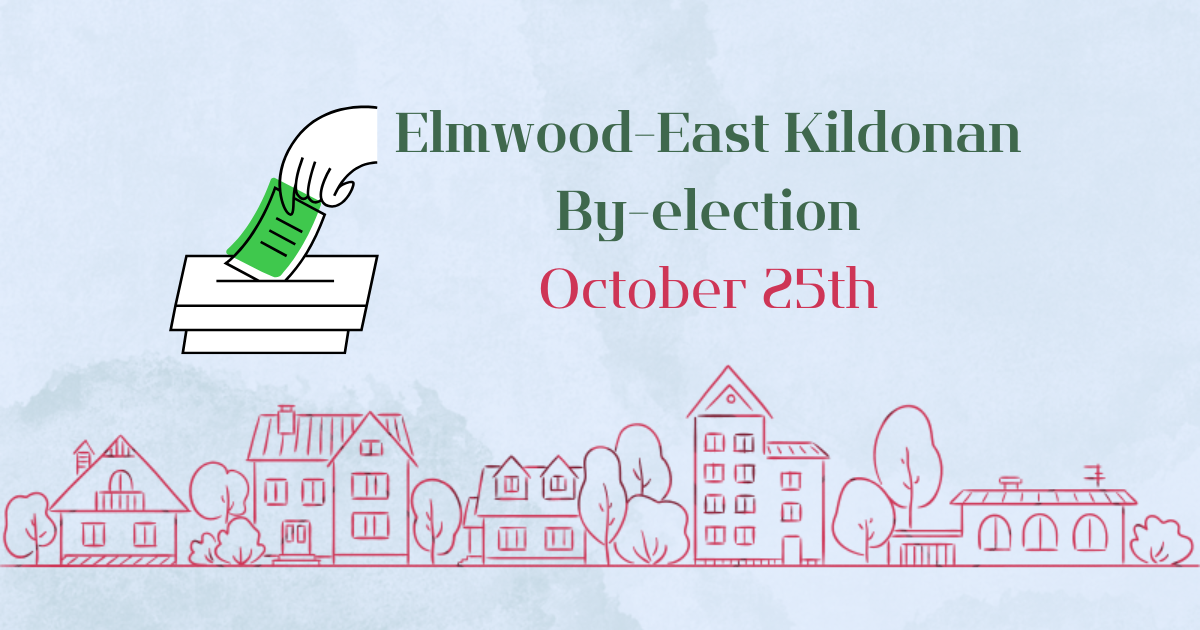There is an upcoming Elmwood-East Kildonan by-election on October 25th, 2025. On October 8th, YIMBY Winnipeg sent out the following questionnaire to all candidates.
The Questions
Below is the list of four Yes/No questions we sent to each candidate and their response. Each response is put in order based on date received, and by no means does this imply YIMBY Winnipeg endorses.
Will you support allowing homeowners to build backyard cottages on their properties?
Why it matters: Backyard cottages (sometimes also known as granny suites or accessory dwelling units) provide a low-impact and cost-effective way to increase housing supply across the city. It allows existing homeowners to make better use of their property, and provides opportunities for aging parents to downsize, adult children to establish themselves, or simply provide a bit of rental income.
Cities with this: Toronto, Vancouver, New Westminster, Kitchener, Windsor, Edmonton, Brampton
| Candidate Name | Response |
|---|---|
| Braydon Mazurkiewich | No |
| Abel Jose Gutierrez | Yes I believe that ADU’s are crucial for todays housing needs. |
| Zekaria Selahadin | Yes |
| Carmen Prefontaine | Yes |
| Kyle Roche | Yes While Winnipeg already allows detached secondary suites, the process is complicated and underused. It should be simpler for homeowners to build safe, well-designed backyard cottages. Resources like the CMHC Housing Design Catalogue will help streamline the process through pre-approved, affordable plans. |
| Emma Durand-Wood | Yes As a city, we should be facilitating the building of backyard cottages for many reasons, like the ones outlined above. This type of housing blends almost seamlessly into the neighbourhood and provides gentle density increases without sticking out. I’ve had several conversations about this topic while door-knocking! Folks are excited about the potential of backyard cottages, but there are still too many barriers to getting them built, such as parking mandates and lot size requirements. I believe making it as easy as possible to build an attached or detached secondary suite is a critical step towards creating more housing options within our city. This opens up development possibilities to regular people who already live in the neighbourhood. The process of adding a secondary suite should be no more onerous than renovating your kitchen or finishing your basement. The city should be streamlining the permits process so that everyone who wants to invest in their home and their neighbourhood can do so with as few obstacles and delays as possible. |
Will you commit to providing property owners with full parking flexibility?
Why it matters: Mandating specific numbers of car parking spaces drives up the cost of housing and often leads to empty and underutilized parking spaces that detract from the appeal and vibrancy of a neighbourhood. Furthermore, the increase in impermeable surface required to satisfy parking mandates leads to the loss of mature trees, increases the amount of sewage entering our river system, and are particularly harmful to small businesses looking to establish themselves.
Cities with this: Edmonton, Vancouver, Montreal, Saskatoon, Toronto
| Candidate Name | Response |
|---|---|
| Braydon Mazurkiewich | Yes |
| Abel Jose Gutierrez | No Many people are using alternative transportation and transit. Parking should be assessed on proximity to amenities and transit. |
| Zekaria Selahadin | Yes Parking minimum from what I have researched and noticed doesn’t seem like puts the trust onto property owners. Property owners have to do the market research and figure out if they can make a impact with less parking or more parking. Parking minimums causes a lot more work for property owners which are smaller and don’t have a lot of capital to stray away from certain communities. Which is not great. I believe in pushing for Parking Flexibility and allowing local, small businesses to flourish and allow them the freedom to know their own customer base. |
| Carmen Prefontaine | Yes |
| Kyle Roche | Yes Cities with more automobile commuters than Winnipeg have successfully dropped parking minimums. It’s time we caught up. |
| Emma Durand-Wood | Yes Increasing parking flexibility is low-hanging fruit that will help get more housing built more affordably! |
Will you commit to allowing homeowners in established neighbourhoods to (re)build using historic lot widths?
Why it matters: The City of Winnipeg requires a minimum lot width of 25 feet to build any new housing. However, in many of Winnipeg’s oldest neighborhoods, including much of Elmwood-East Kildonan, established lots are narrower than this; they are often 22 or 23 feet wide, or sometimes even as narrow as 18 or 19 feet. This makes it harder to build new or rebuild housing where it already existed.
Cities with this: Edmonton, Calgary, Vancouver, Toronto
| Candidate Name | Response |
|---|---|
| Braydon Mazurkiewich | No |
| Abel Jose Gutierrez | Yes |
| Zekaria Selahadin | Yes Being able to rebuild historic building is a great initiative that can bring a lot of beauty and uniqueness to different areas. This will not only be a great in initiative for long term financial and beautification. |
| Carmen Prefontaine | Yes |
| Kyle Roche | Yes It’s absurd that a home can’t be rebuilt on the same lot where one already stood. I do understand concerns about poor workmanship causing issues for neighbours, but that can be addressed through stronger enforcement against bad contractors, not by unnecessary restrictions. |
| Emma Durand-Wood | Yes The variety of sizes and styles of housing in Elmwood-East Kildonan is part of what makes our area appealing and accessible to folks with so many different housing needs and preferences — not to mention, it makes for interesting and varied neighbourhoods! When lots are deemed “too small” to build on, we are limiting the re-investment that’s needed to ensure that our neighbourhoods can evolve in a positive way, rather than slowly decline with housing in poor or derelict condition and vacant lots where nothing can be built. We need to “legalize small”! |
Are there any other housing initiatives that you would like to share?
| Candidate Name | Response |
|---|---|
| Braydon Mazurkiewich | Bring down the boarded up and derelict homes that turn into booze cans, drug dens and eventually get lit on fire. Check out my 1 2 3 plan supported by both Winnipeg Police and Winnipeg Firefighters. These lots can help renew our community and bring in new affordable homes during the national housing crisis. |
| Abel Jose Gutierrez | Tiny home villages are viable option in larger lots that are currently vacant. I also support multifamily development where possible. |
| Zekaria Selahadin | I appreciate all the work that YIMBY Winnipeg has done for the development of different zoning and building laws within Winnipeg. Pushing for change in ways that address not only long term impacts but also short term and addressing them in ways that matter with evidence based research behind you. I always appreciate taking progress and you have done well to push for that. |
| Carmen Prefontaine | |
| Kyle Roche | Winnipeg is already in the process of updating the Zoning By-law and has taken a good step with the Malls and Corridors plan but: in classic Winnipeg fashion, the changes are happening far too slowly. We already have tools like mixed-use zoning on the books, we just don’t seem to want to use them. I want to see faster permitting, pre-approved designs, and incentives for affordable, energy-efficient, and modular construction. We don’t need to reinvent the wheel – we just need to start using it. |
| Emma Durand-Wood | There are so many things we can do to improve housing options within our community, and the topics explored in this questionnaire are important ways to do that. In talking with folks at the doorstep, I’m also hearing that there is a need for support for existing owners and tenants in lower incomes areas to maintain and improve their homes, whether that’s through emergency home repair grants, or energy efficiency improvements, or assistance with tree costs such as pruning hazardous branches. Some of this support already exists thanks to community organizations and other government programs, but I think there is potential to do a lot more of it. It’s important to think about both adding new housing, as well as what’s needed to support existing housing, both as a way to nurture positive change in our neighbourhoods, and also to prevent families and individuals from losing safe, stable housing. |

